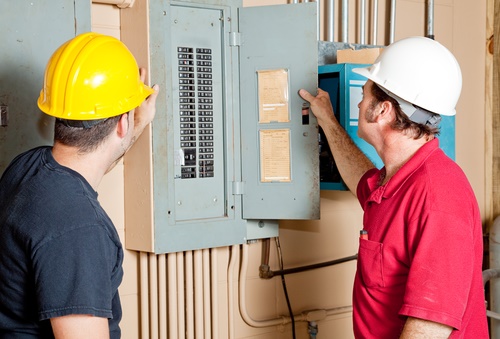Inside a breaker panel, electricity is always flowing — even if you shut off the main power — unless the local utility turns off power to the home. If you have a melted or broken breaker panel or need to add or replace circuits, be safe and do your research before proceeding. The answer is almost always to call a local electrician for help!

What to Do If a Breaker Trips
When a breaker trips, first ask yourself whether you recently plugged in or turned on an appliance. If the breaker tripped for seemingly no reason, you can flip it back on and then wait to see if it trips again.
Open the breaker panel and look for the tripped switch. Push it further toward the off position, then flip it back firmly into the on position. You may want to turn off electronics and appliances in the room before doing this.
If the breaker tripped after you started using an additional device, be very careful! Breakers trip when they sense too much electrical flow on the circuit, so flipping it back on may be asking for trouble. Try relocating some appliances if you have overloaded outlets. Also it is also important to encourage overload protection which can be used as a safety measure.
What Not to Touch
The breaker panel has several parts that may shock or electrocute you, even if power is turned off. Wear insulated gloves and avoid touching these parts:
- The neutral bus bar where all white wires connect
- The main black cable
- All bare metal parts
- Damaged or burnt parts
Tools and Safety Equipment for Electrical Repairs
For real safety, wear insulated electrical gloves and safety goggles if you are doing anything inside the breaker panel besides flipping a switch.
It’s also best to use tools with insulated handles whenever possible.
You should take off any jewelry and avoid letting any metal whatsoever touch the breaker panel, and check to make sure the floor is dry.
Signs of Breaker Panel Damage
If the breaker panel has been damaged, you should not attempt any DIY repairs. A professional electrician should examine the extent of the damage before deciding what to do.
Call an electrician immediately if you see:
- Heat damage (melted, burned, scorched parts)
- Broken connections
- Rust or corrosion
- Mismatched parts from previous repairs
When to Call an Electrician
Every DIY breaker panel repair comes with a major warning — you could seriously injure or kill yourself if you make a mistake.
Many homeowners are comfortable replacing a breaker switch (just the switch, not the actual circuitry). Other projects, like adding a new circuit to the home, are only for people with real electrical experience.
Circuit breaker panel safety is paramount. Don’t risk personal injury or a house fire. We can help add circuits, perform a “heavy up,” or repair overheated or broken circuit breakers. Contact us for safe, professional, and friendly electrical service anywhere in the Sonoma and Marin County area!

